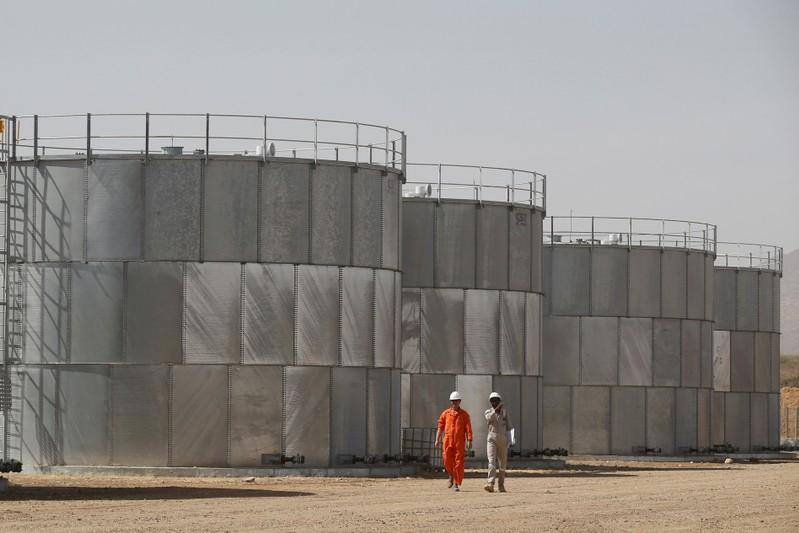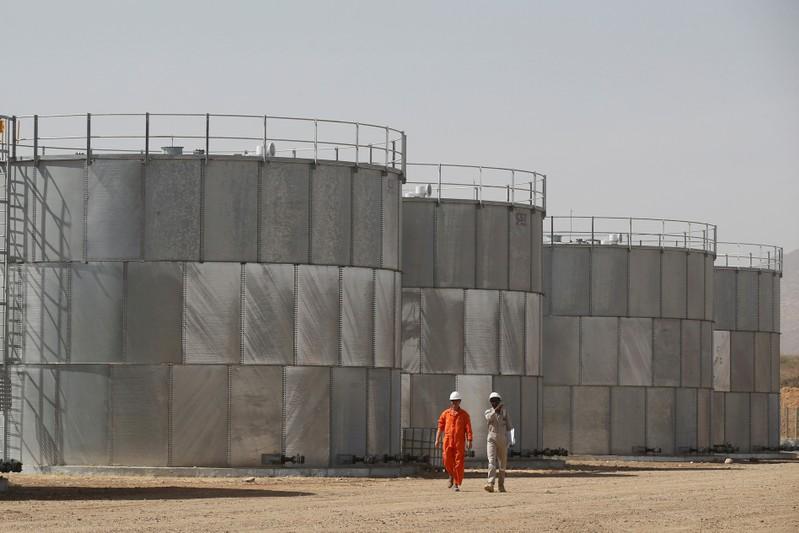
By Jessica Resnick-Ault
NEW YORK (Reuters) - Oil prices pared gains on Monday after worries about oversupply persisted, pulling back from an early rally as OPEC extended supply cuts until March 2020 during a meeting in Vienna.
The Organization of the Petroleum Exporting Countries agreed on Monday to extend oil supply cuts until March 2020, three OPEC sources said, as the group’s members overcame their differences in order to prop up the price of crude amid a weakening global economy and soaring U.S. production.
OPEC is slated to meet with Russia and other producers, an alliance known as OPEC+, on Tuesday to discuss supply cuts amid surging U.S. output.
Brent crude futures for September delivery were up 7 cents a barrel at $64.81 at 1:50 p.m. EDT (1750 GMT) after earlier rallying to $66.75. The August delivery contract closed at $66.55 a barrel on Friday.
U.S. crude futures for August climbed 23 cents to $58.70 a barrel, after earlier hitting their highest in over five weeks at $60.28.
“It’s going to be hard to hold onto the gains: there’s going to be a question in the market as to whether the cuts are enough,” said John Kilduff, a partner at Again Capital Management in New York. “So far they’re getting the benefit of the doubt, but we’ve slipped a bit off the highs.”
Iran - under U.S. sanctions alongside OPEC ally Venezuela - on Monday joined top producers Saudi Arabia, Iraq and Russia in supporting an extension of a supply cut.
Impact Shorts
More ShortsRussian President Vladimir Putin said on Sunday he had agreed with Saudi Arabia to extend existing output cuts of 1.2 million barrels per day (bpd) by six to nine months.
Saudi Energy Minister Khalid al-Falih said the deal would most likely be extended by nine months and no deeper reductions were needed.
“If Russia, Saudi Arabia and the other key OPEC members keep production at the levels they produced in H1-19 they will ensure that the global oil market is not flowing over. They will only have to pay a small restraint while reaping a nice oil price of $60-70 a barrel,” said SEB’s Bjarne Schieldrop.
“OPEC as a whole is losing market share. But this burden is not evenly distributed as it is Venezuela and Iran who are taking almost all the pain.”
Oil prices have come under renewed pressure in recent months from rising U.S. supplies and a slowing global economy.
U.S. crude oil output in April rose to a fresh monthly record of 12.16 million bpd, according to the U.S. Energy Information Administration, even though shale production growth likely peaked last year.
Meanwhile, financial markets were buoyed by a thawing of U.S.-China relations after leaders of the world’s two largest economies agreed on Saturday to restart trade talks.
However, Citi analysts were sceptical that both sides would reach a deal soon.
(Additional reporting by Florence Tan in SINGAPORE and Shadia Nasralla in London; editing by David Evans and Diane Craft)
This story has not been edited by Firstpost staff and is generated by auto-feed.
)